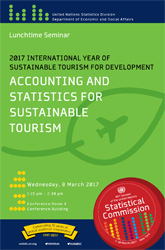United Nations Statistical Commission
Overview 48th Session (2017) Side Events
Lunchtime Seminar
Accounting and Statistics for Sustainable Tourism
at the occasion of 2017 as International Year of Sustainable Tourism for Development
- Wednesday, 8 MAR 2017
- 1:15 - 2:30pm
- Conference Room 4
Meeting organized by World Tourism Organization (UNWTO) and UNSD
Purpose
The objective of this side event is to provide further explanation to the report of UNWTO on tourism statistics (E/CN.3/2017/17). That report describes the planned development of a statistical framework for measuring sustainable tourism to support more integrated measurement and policy in the context of the Sustainable Development Goals (SDGs) and also proposes the development of a compilation guide for the Tourism Satellite Accounts (TSA), and a technical note on linking the System of Environmental Economic Accounting (SEEA) and the TSA. To get a better understanding of what needs to be done, Austria, the Philippines, Fiji and Canada will share their experiences regarding measuring sustainability in tourism and its challenges, including the compilation of the TSA and the linking of TSA and SEEA. They will further provide highlights of their dissemination of tourism indicators, especially the indicators for Sustainable Tourism.
Panel
- Co-Chairs:
- Ms. Clara Van der Pol (UNWTO) & Mr. Ronald Jansen (UNSD) and
IY2017 campaign Video travel.enjoy.respect.
- Panellists:
- Mr. Konrad Pesendorf, Director-General of Statistics Austria and Peter Laimer, Deputy Director of Spatial Statistics at Statistics Austria and Chair of the UNWTO Committee of Statistics and TSA
- André Loranger - Assistant Chief Statistician of Statistics Canada leading broad area of economic and environmental statistics; he is one of the leaders of the UNCEEA
- Ms. Lisa Bersales, National Statistician of the Philippines and co-chair of the IAEG-SDG
- Mr. Epeli Waqavonovono, Government Statistician of Fiji, leading the Fiji Bureau of Statistics
Background
More than one billion tourists travelled during 2016 and it is projected that the annual number of tourists will reach 1.8 billion by 2030. Accounting for 7% of worldwide exports, one in eleven jobs and 10% of the world’s GDP, the tourism sector - if well managed - can foster inclusive economic growth, social inclusiveness and the protection of cultural and natural assets. In this regard, Tourism has not only been a driver for the economic recovery in many countries in the past years but has also been a vital contributor to job creation, environmental consideration and protection, poverty alleviation and multicultural understanding and appreciation.
Four resolutions have been adopted by the UN General Assembly since 2012, acknowledging this increasing role of Tourism in sustainable development:
- Resolution 66/288 - The outcome document of the UN Conference on Sustainable Development titled "The future we want" (27th July 2012).
- Resolution 69/233 on the Promotion of sustainable tourism, including ecotourism, for poverty eradication and environment protection (19th December 2014)
- Resolution 70/1 on Transforming our world: the 2030 Agenda for Sustainable Development (25th September 2015). The main text refers to a determination to promote sustainable tourism (article 33) and explicitly refers to sustainable tourism in three of the 17 Sustainable Development Goals, specifically in targets 8.9, 12.b and 14.7.
- Resolution 70/193 which adopted 2017 as the International Year of Sustainable Tourism for Development
UNWTO and UNSD organize this side-event indeed also to mark the occasion of 2017 as International Year of Sustainable Tourism for Development, and to underline that sustainable tourism is an important element of the 2030 Agenda for Sustainable Development, as it relates to sustainable economic growth and decent employment, as well as to the conservation and sustainable use of oceans. More information on the activities and initiatives to advance sustainable tourism for development can be found at www.tourism4development2017.org
Within the context of the Statistical Commission this side event is intended to highlight the measurement issues of sustainable tourism. The statistical community is responsible to formulate and compile the SDG indicators, including the indicators for sustainable tourism. This, in addition to increased demand from national policy, calls for an integrated approach to measuring sustainable tourism to support evidence based policy making. This requires the development of a measurement framework for sustainable tourism, which should be based on relevant existing publications and international standards. In this case, the international standards are the International Recommendation of Tourism Statistics 2008 (IRTS 2008), the Tourism Satellite Account (TSA) Recommended Methodological Framework 2008, and the System of Environmental Economic Accounting (SEEA 2012). The link between TSA and the System of Environmental-Economic Accounting (SEEA), which was adopted as a standard in 2012, will provide possibilities to derive indicators for the environmental pillar of sustainable tourism according to internationally agreed statistical standards. Furthermore, the TSA will be used as the principle tool to determine the impact of Tourism in terms of its contribution to GDP and employment. To support these efforts, implementation and capacity building for the TSA and SEEA frameworks is also needed.
UNWTO, UNSD and other international and regional partners are committed to support corresponding capacity building activities. In this regard, the statistical community will start drafting the TSA Compilation Guide as a matter of priority. Furthermore, the UNWTO Working Group of Experts on Measuring Sustainable Tourism and the UN Committee of Experts on Environmental Economic Accounting agreed to the drafting of a technical note linking the SEEA and the TSA.
